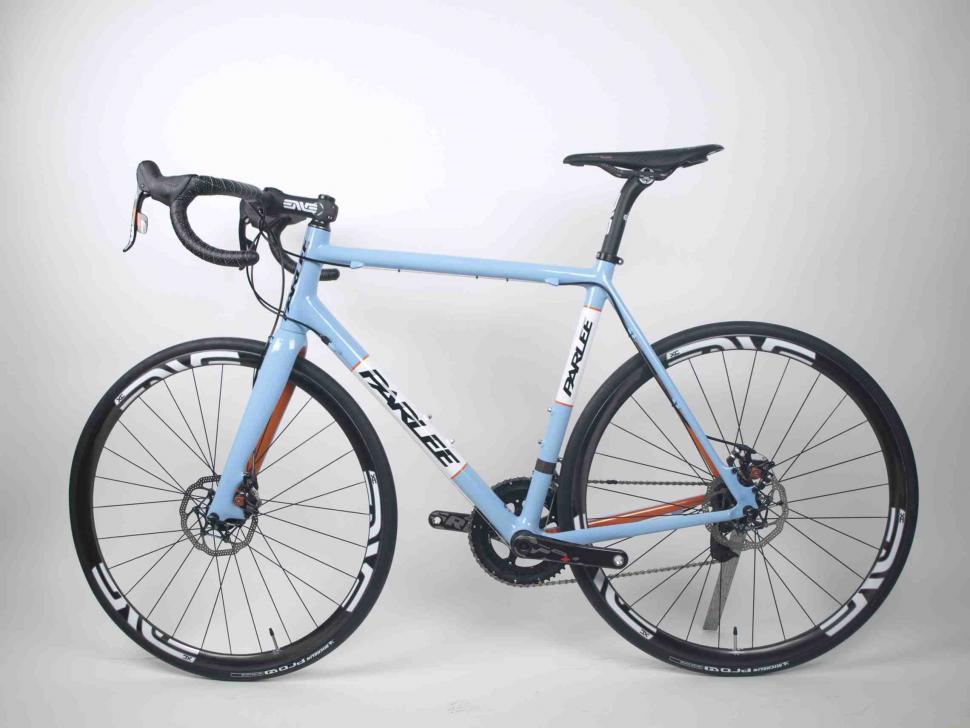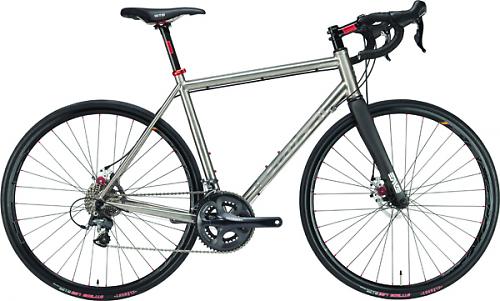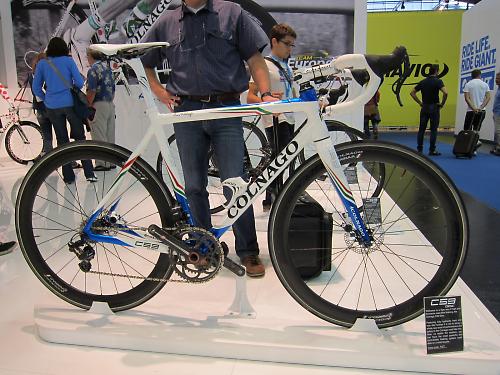- News
- Reviews
- Bikes
- Accessories
- Accessories - misc
- Computer mounts
- Bags
- Bar ends
- Bike bags & cases
- Bottle cages
- Bottles
- Cameras
- Car racks
- Child seats
- Computers
- Glasses
- GPS units
- Helmets
- Lights - front
- Lights - rear
- Lights - sets
- Locks
- Mirrors
- Mudguards
- Racks
- Pumps & CO2 inflators
- Puncture kits
- Reflectives
- Smart watches
- Stands and racks
- Trailers
- Clothing
- Components
- Bar tape & grips
- Bottom brackets
- Brake & gear cables
- Brake & STI levers
- Brake pads & spares
- Brakes
- Cassettes & freewheels
- Chains
- Chainsets & chainrings
- Derailleurs - front
- Derailleurs - rear
- Forks
- Gear levers & shifters
- Groupsets
- Handlebars & extensions
- Headsets
- Hubs
- Inner tubes
- Pedals
- Quick releases & skewers
- Saddles
- Seatposts
- Stems
- Wheels
- Tyres
- Health, fitness and nutrition
- Tools and workshop
- Miscellaneous
- Tubeless valves
- Buyers Guides
- Features
- Forum
- Recommends
- Podcast
feature
 Z0 Disc1
Z0 Disc1The disc brake revolution is coming + industry insider comment
In our 2013 cycling trends and predictions article, one of the recurring predictions is the one about disc brakes on road bikes. It's a controversial subject; since the UCI gave the go ahead for disc brakes on cyclocross bikes, many have been asking when discs are coming to road bikes. And the answer is very soon.
Disc brakes represent the biggest development in road bike technology since the advent of the indexed derailleur. No other development is such a radical overhaul of the status quo as disc brakes. And none seems to be unsettling people as much as disc brakes. We asked a handful of industry bigwigs for their views, you can skip straight to their response here. But first, here's why we think disc brakes on road bikes are the future.
It’s important to separate the emotional response from the pragmatic. The debate has to be whether disc brakes are a good thing for road bikes. There have been many technological developments in road cycling over the year. Some have stuck, others have slipped into the history books. One thing every development shares is initial scepticism, before gradual acceptance. Electronic groupsets offer a good example. They were hated by many when first launched, but they've gradually become a standard, and even the most bitter sceptic will today recognise their value.

Salsa introduced the Colossal, a new disc-equipped road bike in Ti and steel, last year
So, will it be the same for disc-equipped road bikes? Yes, it is going to happen. What is interesting is that I don’t think this a top down development, like many that are first tested in the pro ranks and filtered down to us. I think this will be a bottom-up development. There’s a groundswell of support for their development from real people who aren’t paid to ride bikes. It’s here that they’ll win fans. But I do think, once all the initial obstacles have been overcome, that we’ll see a professional team on disc-equipped bikes in the next five to 10 years.
You only need to look at cyclocross for an example. Discs have been allowed at the highest level for a couple of years now, but the top cyclocross racers just aren’t adopting them. That’s not at all surprising really, in the rarefied air occupied by the top ‘cross racers they’ll stick with tried and tested until there’s a significant performance increase to be gained by any change. There’s a lot of money at stake, and they’re not going to risk it all. There's also not been a serious hydraulic disc offering yet. Yes there's mechanical, but they offer little extra power over calipers and are heavy. They're on their way though. SRAM have developed a hydraulic disc brake and have been testing it with some top US cyclocross racers. All it takes is one win at the highest level, and the tide will turn.
It’s when you step away from the professional scene that you realise where the interest in disc brakes really is. There’s now a huge choice of disc-equipped cyclocross bikes at affordable price points and we’re seeing them sold in decent numbers. It only takes a tyre change to transform a cyclocross bike into a road bike. Everyday cyclists are cottoning on to the benefits and the interest and demand is just growing. It seems only natural that once such riders have experienced the benefits that they'll want discs on their road race bikes too.

BMC's recently introduced GranFondo updated to take disc brakes, spotted at Eurobike late last year
The discs in cyclocross conversation is rather distracting from the really interesting debate though: that of discs on road bikes. Sure, the tough conditions of cyclocross are a good testing ground for the technology, but the same technology has been well proven in mountain biking for the past decade. The mountain bike industry has long since honed disc brakes to perfection, and in the 10 years since we first saw fat tyred bikes sporting disc brakes they’ve been widely adopted. In fact, it’s hard to buy a mountain bike without disc brakes these days.
They make a lot of sense off-road. But on the road? On the road there’s a lot of argument both in their favour and against them. Often people come out with the comment, “You don’t need that much power,” but that’s not the key point about disc brakes. As is the case with cars, motorcycles and mountain bikes, the power can be easily modulated at the lever. It’s about extra control. Better to have a surplus of power you can easily control, than not enough in the first place.
“But road calipers are more than powerful enough,” I hear you crying out at the back. Plenty of the time, yes they are. Ever ridden in the pouring rain and struggled to slow down on a steep descent approaching a junction? Hurtled down an Alpine descent at 100kph and longed for better brakes as you desperately scrub off speed for a tight switchback? Tried to slow down on wheels with a carbon fibre braking surface? I have, and I can tell you, I longed for disc brakes in each situation.
Which leaves us playing a waiting game. There’s clearly a huge interest in the industry, based on the number of disc-equipped road bikes we’ve been seeing this last year, and from cyclists who are ready to adopt this new technology. When SRAM and Shimano release their disc brakes - which, from the rumours we've heard, could be as soon as spring this year - will send the cycling world into a frenzy of excitement.
Colnago wowed the cycling world with the C59 Disc, the first serious offering from one of the Big Brands
The technology already exists, it just needs SRAM and Shimano to adapt it for road bikes. Smaller rotors, lighter calipers, reservoirs integrated into shifter hoods. Frames and forks will need new routing or internal hose guides, and disc mounts will need to be designed into forks and rear triangles. And wheels will need to be redesigned too. But these are small hurdles. As we saw at Eurobike last year, there’s clear indication that many bike brands are already redesigning existing bikes to accept disc brakes. Colnago, Parlee, Time, Specialized, Canyon, BMC and Culprit are just a handful of brands that now offer road bikes compatible with disc brakes.
It’s just a matter of time, but disc brakes are coming to road bikes. It’s going to be an interesting few years and, I like to think, exciting time as we see which way the industry and market shifts.
The industry speaks...
We asked a handful of industry insiders if they think disc brakes are the future, here are their responses:
Keith Bontrager
“Given the inherent braking limitations with light carbon rims, discs are necessary, certainly for pros. If you were to study the thermodynamics in detail you'd come to that conclusion very quickly.
“The obstacles are simple, but not trivial. Structural issues are understood and at least partially sorted with cyclocross bike development.
“I'm guessing, but I think Shimano and SRAM will decide when to implement the changes on the road. It'd be the wild, wild west technically otherwise. Electronic shifting frees up lots of space in the brake levers, so it should be simpler now.”
Paul Lew, Director of Technology and Innovation Reynolds Cycling
Disc brakes hold promise for both cyclists and manufacturers for many reasons. As a designer and manufacturer of carbon fiber wheels, disc brakes create new opportunities for performance improvement and safety. The expectations for disc brakes however can be excessively exuberant. I am not a fan of the idea that disc brakes will solve all of the problems; they may bring problems of their own. As an example, the aerodynamic penalty associated with a disc brake system may not be favored by triathletes, but road cyclists may find that a disc brake system is an ideal solution. The additional mass and form factor of a traditional disc brake system may look appropriate for a cross or mountain bike, but is the look appropriate for a road bike? I am a fan of disc brakes because they represent advancement, a reason to try something a different way. The execution and the integration will play a large part in determining the long-term success.
As far as regulations governing competition permitting disc brake systems, namely UCI regulations: I am one of a handful of industry representative who regularly interface with UCI in a formal setting. I have been told directly that the acceptance of disc brake systems in UCI competition is a minimum of three years away. There are a number of concerns from the perspective of safety and fairness. For example, can cyclists who compete with rim brakes safely compete in a peloton with cyclists using disc brakes? Is there a danger that a bicycle outfitted with disc brakes can stop in a different way than a bicycle outfitted with rim brakes creating a higher-than-normal risk for a crash in close riding conditions? How does this scenario change with weather conditions? These types of questions are at the forefront of concern for the rule-makers. Both cyclists and industry will be required to weigh-in on all benefits and risks before UCI will make any decision regarding disc brakes in competition. How will UCI regulations steer the marketplace?
I don’t think disc brakes are THE solution to specific shortcomings. For example, there is so much discussion about the risks of heat build-up on carbon fiber rims as a result of friction from rim brakes. Disc brakes are the solution, right? Disc brakes are A solution, but not THE solution. We can build carbon structures that can withstand heat from re-entry into the atmosphere. It’s not really a problem building a higher temperature carbon rim structure; the problem is building a higher temperature carbon rim structure for an affordable price. Is this additional price increase to build a higher temperature rim solution more than the additional cost of a disc brake system? These types of questions are now being considered.
In the final analysis, I don’t think disc brakes are necessary, but for the sake of continuing to look for better ways, and for the sake of advancing technology they have a place on the road. The details of where will play out in the coming years.
Dom Mason, Kinesis Bikes designer
“Yes. I think that we will look back with disbelief at the days when we used to squash rubber against alloy/carbon in an attempt to scrub off speed...sometimes our rims even had grit and grime smeared over them to add into the retardation mix!
“Discs make total sense for road bikes and as soon as they get light enough and all the mechanisms are housed in the hoods, then I'm sure we will see them being accepted. Rims can lose some weight because they won't need to be squeezed and have material built in for wear, so the overall weight of the system can be reduced.
“Braking in the wet with carbon rims is a little hit and miss, disc brakes solve this and of course there are the issues of rim wear, melting sidewalls, and brake rub with untrue wheels that discs negate. Disc brakes for 'winter' bikes also make huge sense.
“I realise there are issues surrounding heat build up in small/lightweight rotors and that the force induced on a small diameter road disc with a high friction coefficient riding surface is huge, but these problems will be dealt with and then, we will see disc brakes in the Pro-Tour.”
Ash Clark, Charge Bikes
“There is a genuine argument for having disc brakes on road bikes, they are more powerful than road caliper brakes and they work in all weathers, however, they are not without their cons. They are currently heavier and less aerodynamic than current road brakes and performance orientated frames are going to take a backward step in order to allow discs.
“Ultimately, disc brakes are and aren't the future. The better all round performance of disc brakes will be of genuine value to a certain sector of the road bike market... namely sportive and cyclocross / commuter bikes.
“I don't think we are going to see disc brakes in the peloton for a good few years, if at all.”
Dan Jones, Colnago UK distributor
“Yes, disc brakes offer a proven advantage in every other application they are used in, it was only a matter of time before they found their way on a road bike. “
Ben Coates, Trek Product Manager
“Whether or not disc brakes are the future of road bikes is going to be up to the riders. Obviously, riders don’t ‘need’ disc brakes. We’ve done without them so far. I think we need to consider what a braking system does for a rider in order to understand if it’s something riders will demand.
“Let’s consider the needs of a performance road rider. I believe a brake has three jobs, first and foremost is to be safe and usable in all conditions. Second is to allow the rider to manage their speed. Third is to help the rider go as fast as possible.
“Today, the disc brake options for road do not do any of these things as well as they need to in order to make them viable for this segment. There are a ton of things that need to be considered and addressed before disc brakes can be suitable for performance road use. Weight, aerodynamics, heat dissipation, modulation, and traction on the road are a few that come to mind. If you look at another industry for guidance in disc brake use you can quickly see what challenges might lie ahead.
“Motorcycles have a similar differences in speed, weight, and aerodynamics between road and dirt use. In road motorcycles, you see multiple discs, huge rotors and large calipers to deal with the increased speed, compared what you see on dirt bikes. For bicycles, the expectation of making a compact package with super small rotors using available technology today, isn't likely and definitely isn't ready or an advantage at this point.
“Today, if you want disc brakes on a road bike you are either using mechanical disc brakes with a reduction in performance (in most circumstances but not all) and an increase in weight. If you want hydraulic disc brakes, you are looking at a converter box or some barely existing prototype and taking a big risk that the system you use can dissipate enough heat to be safe.
“In general, I think there needs to be enough demand from riders to warrant the investment into product development. I don’t think we’re there yet. “
Mark Reilly, Enigma Bikes
“I think disc brakes for road are inevitable at some point in the future. As soon as Shimano, SRAM and Campagnolo start making road disc brakes that’s when we’ll see things change.”
So...
The opinions of just this small selection of industry insiders offers an interesting glimpse into the minds of those in charge of designing, speccing and marketing road bikes. While most are in universal agreement with my prediction that disc brakes are coming to road bikes, Trek's Ben Coates signals a more cautionary approach, telling us: "There are a ton of things that need to be considered and addressed before disc brakes can be suitable for performance road use."
Meanwhile, Keith Bontrager answers such caution by saying: "The obstacles are simple, but not trivial. Structural issues are understood and at least partially sorted with cyclocross bike development." Dom Mason supports this, saying: "Discs make total sense for road bikes and as soon as they get light enough and all the mechanisms are housed in the hoods, then I'm sure we will see them being accepted."
All things considered, I feel Ben hits the nail on the end with his final comment: "I think there needs to be enough demand from riders to warrant the investment into product development." So, do you want disc brakes on road bikes?
David worked on the road.cc tech team from 2012-2020. Previously he was editor of Bikemagic.com and before that staff writer at RCUK. He's a seasoned cyclist of all disciplines, from road to mountain biking, touring to cyclo-cross, he only wishes he had time to ride them all. He's mildly competitive, though he'll never admit it, and is a frequent road racer but is too lazy to do really well. He currently resides in the Cotswolds, and you can now find him over on his own YouTube channel David Arthur - Just Ride Bikes.
Latest Comments
- Surreyrider 3 sec ago
This is the way sport coverage is going. But that should mean ending the BBC licence fee, freeing up that money at least to invest in what we...
- stonojnr 3 min 54 sec ago
I did wonder in what way was mandatory light use at night not covered by the current law.
- mitsky 6 min 50 sec ago
This (the health benefits) is one of the economic pillars that we can wave at drivers who complain we don't pay road tax etc....
- JohnMcL7 8 min 28 sec ago
This is my frustration with the service, you're not paying £31 for a premium service for the sport you want to watch, you're paying £31 for a load...
- chrisonabike 30 min 15 sec ago
I'd start even younger... (I actually think driving licences should need renewed after a period, whatever age)....
- Secret_squirrel 2 hours 9 min ago
Good for them and cycling in general.
- brooksby 2 hours 14 min ago
I thought the saying was, "If it bleeds, we can kill it"?
- David9694 3 hours 11 min ago
It's a topsey-turvey world some times:...
- wtjs 1 hour 35 min ago
wtjs who, if I've understood correctly, only reports "must"s now...

Add new comment
68 comments
A few years ago I got back into road after years of Mtbing and using a disk brake Mtb for the commute. I decided to use my new road bike to commute and got caught in a heavy downpour. I remember scaring myself witless when there was no response from the rimbrakes for about 25m. Disc brakes are surely better. I'm sure they will overcome many of the heat issues. Also, if a wheel goes out of true; no real problem with a disc brake.
I worry about the twist torque on weight-pared fork legs. Not a problem with a twin-disc setup though.
Maintaining hydraulic disks really is very straightforward, my MTBs have Shimano SLX brakes and other than a periodic clean and pad swap they are fit and forget. No cables to fiddle with, no need to adjust them as the pads wear and faultless stoping. Every time. Even when completely caked in mud on what passes for a trail in this weather.
Even shortening hoses on a new build is pretty straightforward if you follow the instructions.
And if someone would like to send me that Parlee in XL for testing that would be great.
Heat dissipation is a real issue. Road bikes typically go a lot faster than MTBs, kinetic energy goes up as the square of velocity, road discs are typically smaller than MTB ones -- you've got a lot more energy to get rid of and fewer places for it to go.
I'm sure they'll sort it out, though
How can people say discs wont work for road bikes, nonsense. I've been riding mounting bikes with discs for over ten yrs. not once had over heating, or modulation problems, or any maintenance issues at all, despite riding in tough muddy, wet conditions in uk. I have also used discs for 3 hrs descents in rocky mountains and no issues either, so cant say descents not long enough to challenge mtb discs. Shimano solved all these issues yrs ago and I still ride same rims as they don't wear out (most spokes, hub and bearings changes over yrs of course). Only issue is integrating into shifters all other issues raised nonsense.
The comparison with road vs dirt motorbikes is interesting. Heat build up on the very small surface of a rotor is going to be an interesting issue - having a tiny rotor doesn't seem to help, but a bigger rotor causes more issues with aerodynamics and weight.
Personally, I'm interested in the development - not so much for the braking itself as the ability to make lighter, more aero rims with no rim wear. No more wearing out the rims on a high end wheelset? Yes please!
'So, do you want disc brakes on road bikes?'
No. HTH.
My reservations are the same as with electronic shifting - that self maintenance becomes much harder. I'd ride a single speed if I could get it up the hills!
30 years ago most people could tinker about with their own cars. If something goes wrong now with a car it needs a specialist to plug a laptop into it. Personally, I'd rather bikes didn't go that way - part of their appeal for me is their simplicity.
Pages